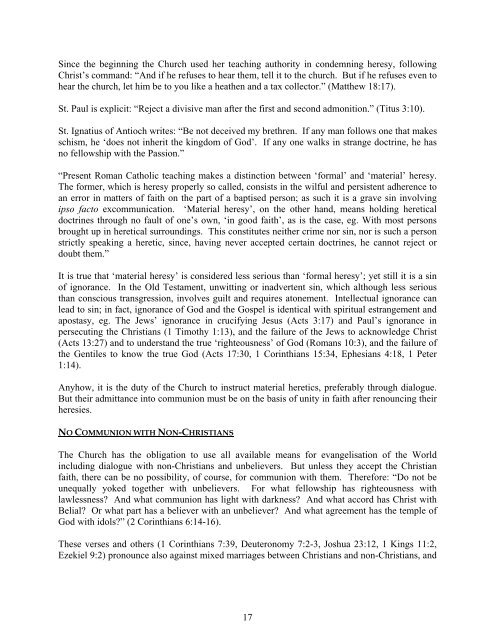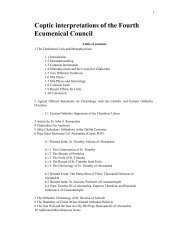Coptic Church & Ecumenical Movement - Saint Mina Coptic ...
Coptic Church & Ecumenical Movement - Saint Mina Coptic ...
Coptic Church & Ecumenical Movement - Saint Mina Coptic ...
Create successful ePaper yourself
Turn your PDF publications into a flip-book with our unique Google optimized e-Paper software.
Since the beginning the <strong>Church</strong> used her teaching authority in condemning heresy, following<br />
Christ’s command: “And if he refuses to hear them, tell it to the church. But if he refuses even to<br />
hear the church, let him be to you like a heathen and a tax collector.” (Matthew 18:17).<br />
St. Paul is explicit: “Reject a divisive man after the first and second admonition.” (Titus 3:10).<br />
St. Ignatius of Antioch writes: “Be not deceived my brethren. If any man follows one that makes<br />
schism, he ‘does not inherit the kingdom of God’. If any one walks in strange doctrine, he has<br />
no fellowship with the Passion.”<br />
“Present Roman Catholic teaching makes a distinction between ‘formal’ and ‘material’ heresy.<br />
The former, which is heresy properly so called, consists in the wilful and persistent adherence to<br />
an error in matters of faith on the part of a baptised person; as such it is a grave sin involving<br />
ipso facto excommunication. ‘Material heresy’, on the other hand, means holding heretical<br />
doctrines through no fault of one’s own, ‘in good faith’, as is the case, eg. With most persons<br />
brought up in heretical surroundings. This constitutes neither crime nor sin, nor is such a person<br />
strictly speaking a heretic, since, having never accepted certain doctrines, he cannot reject or<br />
doubt them.”<br />
It is true that ‘material heresy’ is considered less serious than ‘formal heresy’; yet still it is a sin<br />
of ignorance. In the Old Testament, unwitting or inadvertent sin, which although less serious<br />
than conscious transgression, involves guilt and requires atonement. Intellectual ignorance can<br />
lead to sin; in fact, ignorance of God and the Gospel is identical with spiritual estrangement and<br />
apostasy, eg. The Jews’ ignorance in crucifying Jesus (Acts 3:17) and Paul’s ignorance in<br />
persecuting the Christians (1 Timothy 1:13), and the failure of the Jews to acknowledge Christ<br />
(Acts 13:27) and to understand the true ‘righteousness’ of God (Romans 10:3), and the failure of<br />
the Gentiles to know the true God (Acts 17:30, 1 Corinthians 15:34, Ephesians 4:18, 1 Peter<br />
1:14).<br />
Anyhow, it is the duty of the <strong>Church</strong> to instruct material heretics, preferably through dialogue.<br />
But their admittance into communion must be on the basis of unity in faith after renouncing their<br />
heresies.<br />
NO COMMUNION WITH NON-CHRISTIANS<br />
The <strong>Church</strong> has the obligation to use all available means for evangelisation of the World<br />
including dialogue with non-Christians and unbelievers. But unless they accept the Christian<br />
faith, there can be no possibility, of course, for communion with them. Therefore: “Do not be<br />
unequally yoked together with unbelievers. For what fellowship has righteousness with<br />
lawlessness? And what communion has light with darkness? And what accord has Christ with<br />
Belial? Or what part has a believer with an unbeliever? And what agreement has the temple of<br />
God with idols?” (2 Corinthians 6:14-16).<br />
These verses and others (1 Corinthians 7:39, Deuteronomy 7:2-3, Joshua 23:12, 1 Kings 11:2,<br />
Ezekiel 9:2) pronounce also against mixed marriages between Christians and non-Christians, and<br />
17








